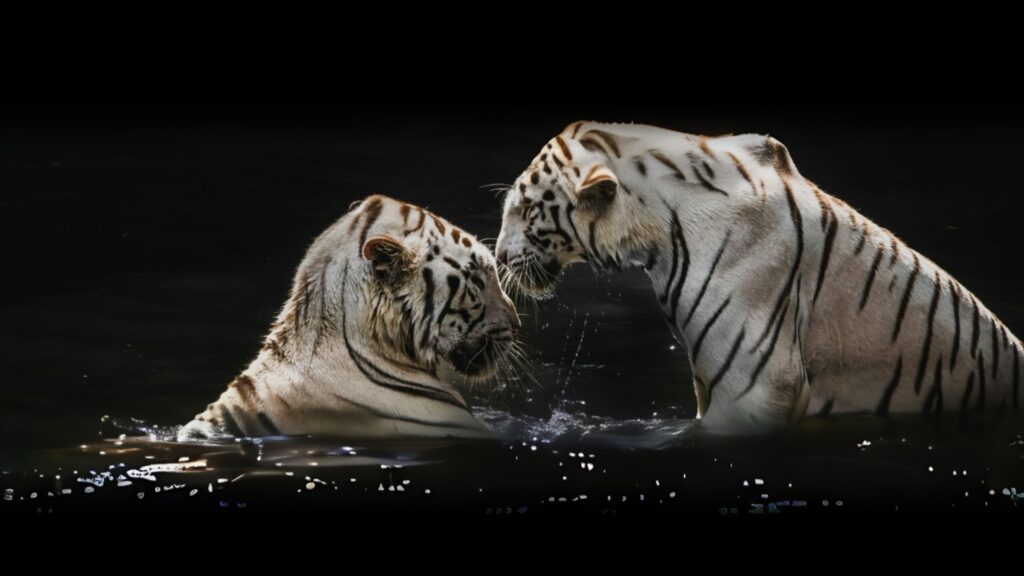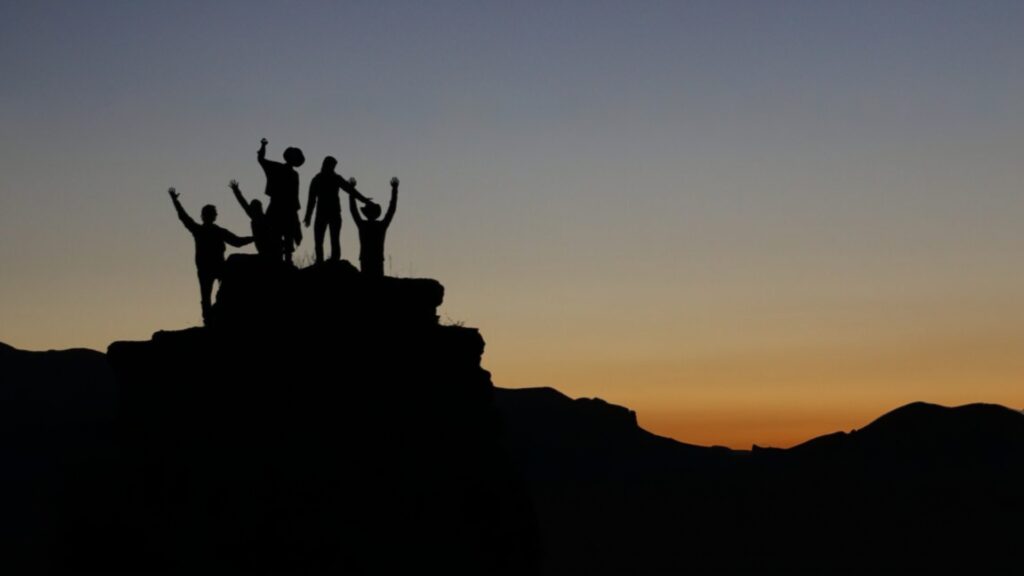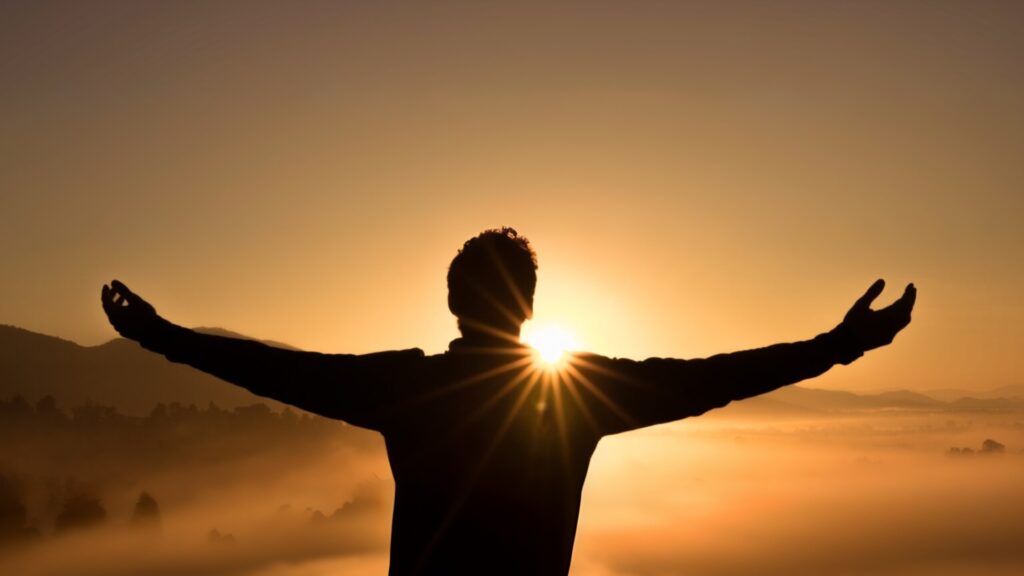
To usher in Diamond Approach Online’s 2024 theme of working with the instinctual human drives, Diamond Approach founders A.H. Almaas (Hameed Ali) and Karen Johnson were interviewed for their reflections on the social, sexual and survival instincts. At this time of uncertainty – when we see the human instincts manifesting in distorted harmful ways throughout the world – Hameed and Karen felt it was particularly important to support our global community by offering teachings on the instincts to the public for the first time. The first of a three-part blog series, this blog delves into the social instinct, its origins and purpose, how it can become distorted and how it can be liberated to support our realization.
Sustaining our realization in the world is intertwined with our survival instincts. Biologically wired within us, the social instinct is the most evolved of the three primary instincts, which include the social, sexual and survival drives. Working with the instincts is an important aspect of the spiritual journey and integral to the Diamond Approach. Without confronting our instincts, learning to understand and develop them, and without integrating them with our spiritual nature, we cannot actualize our realization, meaning it becomes difficult to sustain our realization in the world.
Inquiring into our instincts and bringing conscious awareness to where they can go awry helps to liberate them, which supports our expression as fully realized human beings in the world. In Diamond Approach Online’s current course, Human Instincts on the Inner Journey, Hameed and Karen open the course by exploring the social instinct because it is often the most easily accessible in our everyday lives. While all of our instincts run deep, the sexual and survival instincts originate from the more primitive limbic brain and can be harder to comprehend and work with. Likewise, in this blog series, we are focusing first on the social instinct and will examine the other two instincts in later blogs.
Everybody is a social being, whether they seek community or prefer isolation. No human being can very well live 100% on their own. We all have an innate social drive to be with others, even if we are not in touch with this part of ourselves. Originally, the social drive inspired people to gather, to come together as a community and develop skills and capacities to support the tribe. You can see that without this drive, humans may not have survived at all. Evolving out of the survival instinct, the social instinct enables human beings to thrive much more fully.
Our relationships provide a rich environment to support our evolution. Liberating the social instinct from the survival instinct is one of the ways the social instinct can enable the spiritual energy to open up and develop. So, we want to liberate the drive and allow that drive to fulfill a different kind of destiny over and above just the thriving of our bodies and our communities.

For most people, their instincts are not free. Rather, the instincts are held captive by their early life experiences and conditioning. The social instinct mirrors what we learned from our parents and people close to us, patterning the way we interact and the way we are social. It is distorted by the impact of these original relationships and also because it is mostly serving the survival instinct.
As a result, its expression is limited instead of being free to really express our social need for connection, nearness, intimacy, love and exchange, all expressions that enhance our life and our experience of ourselves. While the social instinct is important for human survival, its benefits are not limited to social interactions. As we interact, we learn about ourselves, we develop, and if the social instinct is liberated, we can develop in a more real way, which means including the spiritual dimension.
It is becoming increasingly obvious that love and the spiritual element are missing in the relational field, in our communities and in the world. We’ve become nationalistic, more polarized, more invested in revenge, and the pain continues to amplify itself. The polarization in our society is one of the ways that we are seeing the social instinct expressed in a distorted way. We are not listening to each other, not respecting each other, seeing the other as an opponent, as an enemy, instead of just another human being with another perspective.
Another misuse of the social instinct is the prevalence of disparity in our society, not just between races and ethnic groups, but also between men and women, different age groups and socioeconomic levels. These disparities are examples of the social instinct being used to create a group mentality that gives us a false sense of identity or power. We identify with groups or systems of thought to augment and rigidify our identity. This way, we don’t have to face the truth that there is a hole we are filling to escape the pain of having lost touch with an aspect of our Essential Nature. If the social instinct were liberated, we would interact with each other as human beings rather than as races, political categories or spiritual beliefs. Differences between people may be challenging to work through, but they can also be interesting and life-enhancing instead of something we seek to avoid.
It’s natural for the survival instinct to drive us to identify with groups and communities and then to become territorial, feeling the need to defend our identities against what we perceive are threats from “other” groups and communities that are different in some way. Polarization heightens the social drive beyond necessity, distorting the social instinct into a power play instead of an enhancement. But if we can liberate the energy of the social instinct, which operates from the heart center, we can bring more heart into our interactions. We can enrich our ability to communicate and have contact with one another, which grows into a capacity to share at a deeper level. We can feel in our spiritual nature that it is a real connection, a loving kind of sharing. Wanting to share in this way with another person is about spiritual love, which has the power to turn polarity and “otherness” into “complementarity” – an ability to give and receive different kinds of input without bias or judgment.

Liberating the social drive enables us to be open to different ways that we can look at the world and share with each other. As the relational element begins to develop with love, with heart, with the fullness of what heart can be on a spiritual level, those needs for survival become less and less, and there’s more generosity, more openness. And we can see in the world today that that’s what’s needed. The more liberated our social instinct is, the easier it is for us to make friends and sustain relationships. And the more developed our social instinct becomes, the more our friendships can be deep and profound and meaningful.
When we liberate the social instinct, the drive for survival as a body becomes survival of the psychological self. And if the drive is liberated, then what can develop is a real human being. In other words, a being of presence. What we mean by presence is really that consciousness develops, not just the body, not just the psyche, but actually what we are as a spiritual being in the world, giving consciousness the potential to fulfill itself in a much more human way. The form of being human can actually shift from the animal to an entirely different creature so that we’re not driven like an animal. Instead, we’re driven from a more basic source of the energy of the instinctual drive, liberating and growing and becoming more sparkling, more rich, more fulfilling of something beyond the drive to be protective of oneself.
And the relational instinct becomes also our relationship with our deeper nature, a relationship with the divine, a relationship with God. And that deeper reality becomes part of all relationships, expressing itself through human beings, really bringing light and presence into the world. By learning who we are as human beings, we can develop a clearer consciousness that enriches our inner relationship and then expresses itself in our worldly relationships.
Working to liberate and develop our instincts requires more than just meditation or concentration. We need to deal with the instincts directly by exploring our experience with them to learn about our patterns and distortions that limit the full expression of our nature. Inquiring into the instincts can help us see what needs to happen to let the inner animal out of the cage and into its more evolved, free expression. By engaging in inner work, we can liberate and develop our instincts so that our lives can be more full.
Learn How to Work with Your Instincts as Fuel for the Spiritual Journey

If this blog resonates with you and you are interested in exploring your instincts further, join us for Human Instincts on the Spiritual Journey, a course taught by A.H. Almaas (pen name for Hameed Ali) and Karen Johnson. Through teachings and inquiring into your own experience in our global online community, you can take a deep look at your social, sexual, and survival instincts to see how they became impediments to your full realization. Bringing conscious awareness to these inner processes has the potential to liberate your instincts from historical conditioning and to support your embodiment as a fully realized human being.
New to this Topic?
Learn More in Realization in the Rough, a free talk with A.H. Almaas and Karen Johnson

Enjoy this video recording with Diamond Approach co-founders, A.H. Almaas (pen name of Hameed Ali) and Karen Johnson, to learn more about the instincts including how they are showing up in our daily lives and how working with them allows us to bring more light and consciousness into the world.
